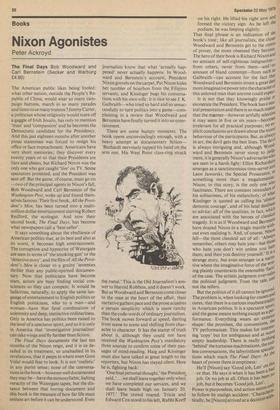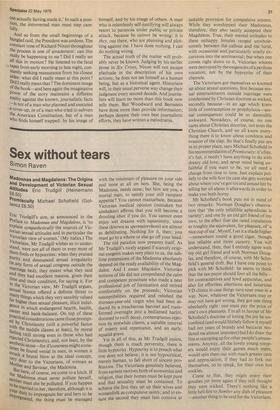Books
Nixon Agonistes
Peter Ackroyd
The Final Days Bob Woodward and Carl Bernstein (Secker and Warburg £4.90) The American public likes being fooled : what other nation, outside the People's Republic of China, would wear so many campaign buttons, march in so many parades and listen to so many truisms ?Jimmy Carter, a politician whose religiosity would scare off a gaggle of Irish Jesuits, has only to mention 'trust' and 'compassion' and he becomes the Democratic candidate for the Presidency. And this just eighteen months after another pious statesman was forced to resign his office or face impeachment. Americans have very short memories; they discover every twenty years or so that their Presidents are liars and cheats, but Richard Nixon was the only one who got caught 'live' on TV. Some spectators protested, and the President was sent off. But the game, of course, must go on —two of the principal agents in Nixon's fall, Bob Woodward and Carl Bernstein of the Washington Post, woke up and found themselves famous. Their first book, All the President's Men, has been turned into a multimillion dollar entertainment starring Robert Redford, the ecologist. And now their second book, The Final Days, has become what newspapers call a 'best-seller'.
It says something about the ebullience of American politics that, at its best and also at its worst, it becomes high entertainment. The corruption and hypocrisy of Watergate are seen in terms of 'the smoking gun' or the 'detective story', and the film of All the President's Men is closer to a grainy 'seventies thriller than any public-spirited documentary. Now that politicians have become stars, actors are busy finding social consciences so they can compete. It would be ludicrous, naturally, to apply the same language of entertainment to English politics or English politicians, who to a man—and woman—have that fatal combination of solemnity and deep, instinctive ordinariness. Only in America has politics been raised to the level of a spectator sport, and so it is only in America that 'investigative journalism' can take wings and fly further than fiction.
The Final Days documents the last ten months of the Nixon reign, and it is so detailed in its treatment, so unabashed in its revelations, that it peeps in where even Gore Vidal would fear to look. It is not 'realistic' in any purist sense; none of the conversations in the book—however well documented they may be—have the monosyllabic, halting veracity of the Watergate tapes, but the distance between that boring document and this book is the measure of how far life must imitate art before it can be understood. Even journalists know that what 'actually happened' never actually happens. In Woodward and Bernstein's account, President Nixon grovels on the carpet, Pat Nixon hides her tumbler of bourbon from the Filipino servants, and Kissinger bugs his conversations with his own wife: it is nice to see J. K. Galbraith—who tried so hard and so unsuccessfully to turn politics into a game—complaining in a review that Woodward and Bernstein have finally turned it into an entertainment.
There are some bumpy moments. The book opens unconvincingly enough, with a heavy attempt at documentary fiction'Buzhardt nervously tapped his hand on the arm rest. His West Point class-ring struck the metal.' This is the Old Journalism's answer to Harold Robbins, and it doesn't work. But as Woodward and Bernstein come closer to the man at the heart of the affair, their narrative gathers pace and the prose acquires a certain simplicity which is more catchy than the code-words of ordinary journalism. The book moves forward at speed, darting from scene to scene and shifting from character to character. It has the stamp of truth about it, although they could not have received the Washington Post's mandatory three sources to confirm some of their passages of mind-reading. Haig and Kissinger must also have talked at great length to the reporters, but Nixon has stayed silent. Here he is, fighting back : 'One final personal thought,' the President said, `... we shall leave together only when we have completed our services, and we shall leave heads high on January 20, I977.' The crowd roared. Tricia and Edward Cox stood to his left, Rabbi Korff on his right. He lifted his right arm and formed the victory sign. As he left the podium, he was limping slightly.
That final phrase is an indication of the book's tone; like all journalists, the closer Woodward and Bernstein get to the centre of power, the more obsessed they become. The hero of their book is Richard Nixon and no amount of self-righteous indignation from others, never from them—and n" amount of bland contempt—from such as Galbraith—can account for the fact that Woodward and Bernstein invest a great deal more imaginative power into the characterof this unloved man than anyone could exPect" It is not that they knowingly praise nr exonerate the President. The book has a nal" tral presentation and there is so much matter that the manner—however artfully selective it may seem in five or six years—becotnes irrelevant for all practical purposes; no e%; plicit conclusions are drawn about the moral behaviour of the participants. But, as alwaY.5, in art, the devil gets the best lines. The dev" is always intriguing and, although Woodward and Bernstein never stoop to ind,g,, ment, it is generally Nixon's adversaries VIEW are seen in a harsh light : Elliot Richardson emerges as a sanctimonious time-scrver ana Leon Jaworski, the Special Prosecutor, 85 something more than a megalomaniac' Nixon, in this story, is the only one vvialf fascinates. There are constant reminders 0, his solitariness, of his melancholy, of What Kissinger is quoted as calling his 'AM demonic courage', and of his fatal deafness to advice: all of the qualities, in fact, which] are associated with the heroes of classiea tragedy. It is as if' Woodward and Bernstein have draped Nixon in a tragic mantle without even realising it. And, of course, i'4l7W„ris fell—the most classical act of all : 'Alwar remember, others may hate you—but those who hate you don't win unless you hare them, and then you destroy yourself.' It is a strange story, but even stranger in a nail!' tive where the imaginative force of the ing plainly counteracts the ostensible lacirss of the case. The artistic judgment over1dthe political judgment. Trust the tale, arl
not the tellers.
But the politics of it all cannot be ign°red,i The problem is, when looking for causes 3,11,`: cures, that there is a curious insubstantiall7 in American politics. It is a spectator sP°r,', and the game means nothing except as a formance. Everything wears an exter,thcle shape: the promises, the conventions, TV performances. This makes for intereso ing 'copy' but for ambiguous and at empty leadership. There is really nothind, 'behind' the tortuous machinations, thee a, less conversations, the labyrinthine srecti,,,e tions which mark The Final Days.
heart of power there is emptiness: this
He'll [Nixon] say 'Good job, Len' t,ad or that. He says it when it has been a 'flo
job. Or no job at all. Often it has been
job, but it becomes 'Good job, Len'. illy Power is purposeless, and action seems ° is, to follow by malign accident : 'Character tically, he [Nixon] arrived at a decision with
out actually having made it.' In such a position, the introverted man must step care fully.
And so from the small beginnings of a bungled raid, the President was undone. The constant tone of Richard Nixon throughout the process is one of amazement: can this really be happening to me? Did I really set all this in motion? He listened to the fatal n tapes from early morning to late night, constantly seeking reassurance from his closest aides: what did I really mean at this point ? Did I really mean that ?The dominant image Of the book—and here again the imaginative Power of the story maintains a different reality against the known, journalistic facts —is not of a man who planned and executed a cover-up, or of a man who tried to subvert the American Constitution, but of a man Who finds himself trapped: by his image of himself, and by his image of others. A man who is relentlessly self-justifying will always resort to paranoia under public or private attack, because he cannot be wrong: it is they, out there, who are planning and plotting against me. I have done nothing, I can do nothing wrong.
The actual truth of the matter will probably never be known. Judging by his earlier prose in Six Crises, Nixon will not escape platitude in the description of his own actions; he does not see himself as a human being, but as a historical agent. Historians will, in their usual perverse way change their judgment every second decade. And journalists will learn no more than this book now tells them. But Woodward and Bernstein have done more than provide information; perhaps despite their own best journalistic efforts, they have written a melodrama.



































 Previous page
Previous page